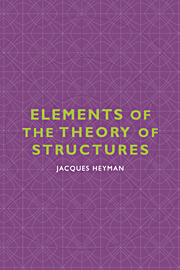Book contents
- Frontmatter
- Contents
- Preface
- 1 The theory of structures
- 2 Virtual work
- 3 Betti, Maxwell, Müller-Breslau, Melchers
- 4 Jettied construction
- 5 Clebsch, Macaulay, Wittrick, Lowe
- 6 The elastica
- 7 Mechanisms of collapse
- 8 The absolute minimum-weight design of frames
- 9 Inverse design of grillages
- 10 The relation between incremental and static plastic collapse
- 11 The bending of a beam of trapezoidal cross-section
- 12 The simple plastic bending of beams
- 13 Leaning walls; domes and fan vaults; the error function ∫e−t2dt
- Bibliography
- Name index
- Subject index
13 - Leaning walls; domes and fan vaults; the error function ∫e−t2dt
Published online by Cambridge University Press: 18 December 2009
- Frontmatter
- Contents
- Preface
- 1 The theory of structures
- 2 Virtual work
- 3 Betti, Maxwell, Müller-Breslau, Melchers
- 4 Jettied construction
- 5 Clebsch, Macaulay, Wittrick, Lowe
- 6 The elastica
- 7 Mechanisms of collapse
- 8 The absolute minimum-weight design of frames
- 9 Inverse design of grillages
- 10 The relation between incremental and static plastic collapse
- 11 The bending of a beam of trapezoidal cross-section
- 12 The simple plastic bending of beams
- 13 Leaning walls; domes and fan vaults; the error function ∫e−t2dt
- Bibliography
- Name index
- Subject index
Summary
Masonry may be regarded as an assemblage of dry stones (or bricks or other similar material), some squared and fitted and some not, placed together to form a stable structure. Any mortar that may have been used will have been weak, and may have decayed with time; it cannot be assumed to add strength to the construction. Stability of the whole is assured, in fact, by the compaction under gravity of the various elements; a general state of compressive stress can exist, but only feeble tensions can be resisted.
This is the unilateral model of masonry; the material can resist compression, but has zero tensile strength. Further, compressive stresses in masonry structures are usually very low indeed, so that the material may be assumed, effectively, to be infinitely strong in compression. To add a final and imprecise assumption, it is clear that individual components of a masonry structure must in fact possess tensile strength, even if the overall assemblage has none. As an example, it is easy to envisage a dry stone wall in which the stones can indeed be lifted away, but which, in the absence of such interference, will retain its structural shape. The stones must, however, have a certain shape and size; an attempt to build a vertically sided wall from small particles (sand) will be unsuccessful.
The leaning wall
The foundations of a wall will be supposed to give way differentially, so that the wall tilts.
Information
- Type
- Chapter
- Information
- Elements of the Theory of Structures , pp. 118 - 131Publisher: Cambridge University PressPrint publication year: 1996
